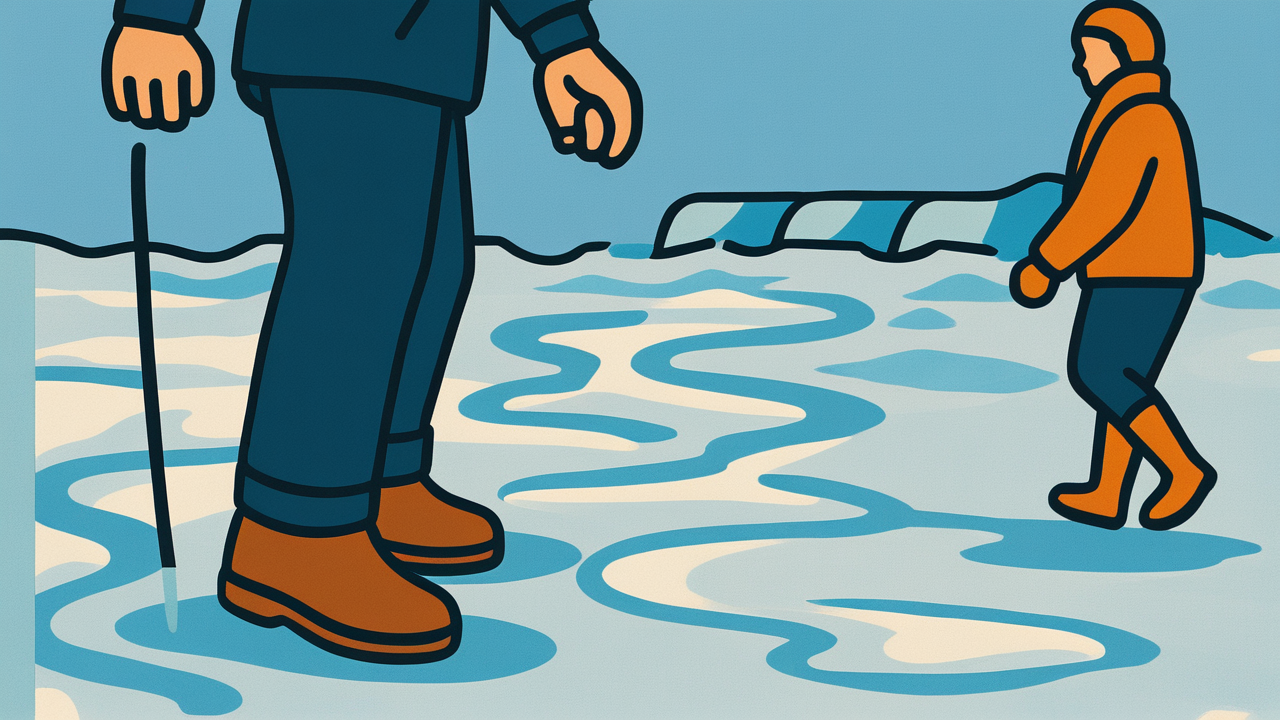How to Read “薄氷を履むが如し”
Hakuhyō wo fumu ga gotoshi
Meaning of “薄氷を履むが如し”
“Like treading on thin ice” describes being in an extremely dangerous and unstable situation where one must act with constant utmost care and attention.
It is used in tense situations where, like walking on thin ice, one wrong step could lead to a terrible predicament. This proverb doesn’t simply express fear of danger, but rather shows an attitude of acting responsibly and cautiously while recognizing that danger. It is used in critical moments where failure is not permitted, such as when politicians face important decisions, when business leaders make judgments that determine their company’s survival, or when doctors undertake difficult surgeries. The reason for using this expression is to accurately convey the gravity of the situation and the weight of tension and responsibility felt by the person taking action. Even today, it lives on as a way to express one’s state of mind in high-pressure situations or circumstances requiring careful judgment.
Origin and Etymology
The origin of “Like treading on thin ice” can be found in a passage from the “Xiao Ya” section of the ancient Chinese classic “Book of Songs” (Shijing): “Trembling with fear and caution, as if facing a deep abyss, like treading on thin ice.” This was a poem from the Zhou Dynasty era, recorded as a lesson teaching that rulers and leaders should always be prudent.
The classical term “fumu” differs from the modern “haku” and was used to mean “step on” or “tread.” It’s a metaphor expressing the tension and fear of walking on thin ice, never knowing when it might crack and cause one to fall into the water.
This expression was introduced to Japan during the Nara to Heian periods and came to be used among nobles and monks who had knowledge of Chinese literature. It was particularly favored by those in political positions to express the dangerous situations they found themselves in.
What’s interesting is that this expression didn’t merely represent fear, but rather captured “prudence” and “humility” as virtues that those in positions of responsibility should possess. The ideal was to have both the courage to keep moving forward even in situations like walking on thin ice, and the wisdom to exercise utmost care at the same time.
Usage Examples
- I was appointed as the leader of a new project, but taking on this responsibility while the company’s performance is deteriorating is like treading on thin ice
- Making investment decisions during this period of unstable stock prices is truly like treading on thin ice
Modern Interpretation
In modern society, the expression “like treading on thin ice” has come to be used in more familiar and diverse situations. In an era where the spread of social media means individual statements can be instantly disseminated worldwide, not only public figures but ordinary people must constantly be aware that their words and actions could unexpectedly cause controversy.
Particularly in the business world, globalization and digitization mean that corporate misjudgments are immediately reflected in stock prices, and situations where a company’s survival becomes questionable overnight are not uncommon. Startup company executives and investors putting money into new technologies spend their days truly walking on thin ice.
On the other hand, modern times have also seen criticism of “the harm of being too afraid of risk.” In an era of rapid change, being overly cautious can actually cause one to miss opportunities. Therefore, the interpretation of this proverb is also shifting toward “taking necessary risks while maintaining appropriate tension.”
Additionally, from a mental health perspective, attention is being paid to the psychological burden of constantly being in a state like treading on thin ice. It’s now thought that modern people need proper stress management and sometimes the courage to “step off the thin ice.”
When AI Hears This
The choice of the Chinese character “履” (to wear/step carefully) reflects ancient Chinese people’s profound understanding of acute bodily sensations. While modern usage often expresses this as “stepping on thin ice,” the original “履” refers to the delicate action of sensing the ice’s condition through the entire sole of the foot.
The act of stepping is momentary and forceful, but the act of “履” is sustained and cautious. When walking on thin ice, the soles of our feet continuously gather subtle information—the ice’s thickness, temperature, vibrations, and creaking sounds. This bodily sensation serves as the most crucial sensor for detecting danger in advance.
Modern crisis management studies have renewed appreciation for the importance of “embodied knowledge.” This follows the same principle as experienced pilots detecting mechanical failures through minute aircraft vibrations before instruments show abnormalities, or skilled craftsmen judging material quality through sound and touch. The ancients used “履” to express the importance of sensing danger through the entire body, not just logical thinking.
In essence, this proverb teaches that in critical situations, being sensitive to the warning signals our bodies emit is more important than thinking with our heads. The character choice of “履” represents the crystallization of ancient China’s deep insights into bodily sensation.
Lessons for Today
What this proverb teaches us today is that “appropriate tension produces the best performance.” Situations like walking on thin ice are certainly anxiety-inducing, but it’s precisely because of that tension that we can heighten our concentration and demonstrate greater attentiveness than usual.
What’s important is not being crushed by that tension, but making it your ally. Important presentations, life-changing interviews, the first step toward new challenges. The feeling of “like treading on thin ice” in such situations is also proof that you’re taking those matters seriously.
In modern society, there are increasing situations where perfection is demanded, but if you move forward step by step, treasuring each one like when walking on thin ice, you’ll surely reach your destination. And above all, when you overcome such tense experiences, you’ll be much stronger and wiser than before. Without fear, but carefully, please walk on your own thin ice.



Comments